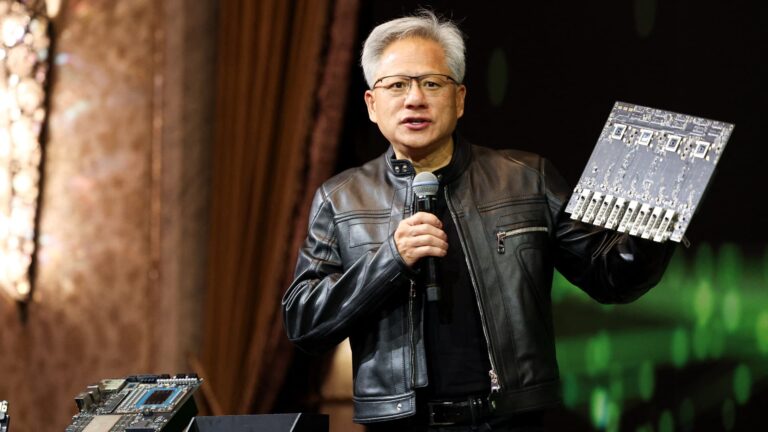Jensen Huang, co-founder and CEO of Nvidia Corp., speaks during a news conference in Taipei on May 21, 2025. Cheng / AFP) (Photo by I-HWA CHENG/AFP via Getty Images)
I-hwa Cheng | Afp | Getty Images
Nvidia on Wednesday announced a slew of partnerships with European countries and companies spanning infrastructure to software as it looks to keep itself at the center of the global artificial intelligence story.
Chief Executive Jensen Huang on Wednesday continued his tour of Europe with a keynote at Nvidia’s GTC event in Paris, France, where he laid out some key European partnerships.
Nvidia has been keen to position itself as an infrastructure company that can help countries and governments build data centers using its graphics processing units to unlock the potential of AI for local economies and populations. As part of that effort, Huang recently carried out a similar whirlwind trip to the Middle East, where Nvidia is planning to sell its latest chips as part of big data center buildouts in Saudi Arabia and the United Arab Emirates.
“Every industrial revolution begins with infrastructure. AI is the essential infrastructure of our time, just as electricity and the internet once were,” Huang said in a Wednesday press release.
“Europe has now awakened to the importance of these AI factories, the importance of this AI infrastructure,” Huang said during a separate presentation on Wednesday. AI factories is the term Nvidia uses for massive data centers containing its GPUs.
Huang added that AI computing capacity in Europe will grow by a factor of 10 in the next two years.
The tech giant seeks to expand its international footprint and embed itself in national level AI infrastructure. That push into new markets is even more critical as U.S. export restrictions on Nvidia’s most advanced chips have lost the company revenue in China.
Nvidia said it is working with country governments, regional cloud and telecommunications firms and technology centers in Europe.
One of the key partnerships announced is between Nvidia and French startup Mistral, which will build an “AI cloud” that will deploy 18,000 Nvidia Grace Blackwell chips. This will allow businesses to develop and use AI through Mistral’s models, Nvidia said.
Nvidia also announced infrastructure projects in Italy and Armenia.
Orange and Telefonica are among the telecommunications companies also working with Nvidia in areas such as deploying AI applications and large language models as part of the newly announced deals.
In Germany, Nvidia said it is building what it has dubbed as an “industrial cloud” that will feature 10,000 GPUs and will be specifically designed to provide services for European manufacturers.
The big focus from Nvidia in Europe is around so-called “sovereign AI,” the idea that data centers and servers that are providing services to users in the European Union, are actually located regionally rather than abroad.
Nvidia also announced so-called “tech centers” in Europe, which will focus on advanced research, upskilling workforces and accelerating scientific breakthroughs in countries including the U.K., France, Spain and Germany.
Nvidia also expanded a product called DGX Cloud Lepton — something of a marketplace for GPUs — with new cloud providers and integrated it with AI model repository Hugging Face. DGX Cloud Lepton works by allowing developers to access GPUs across the world to run AI applications.
Software push
While Nvidia is best-known for its hardware — its infamous GPUs — the technology giant has ramped up its focus on its software offering to help keep the company at the center of fast-moving AI development.
That software push has continued into Europe.
Last year, Nvidia announced a product called Nvidia NIM, which is effectively a pre-packaged AI model that can be quickly deployed and that lets developers build apps on it. Nvidia on Wednesday announced any large language model available on Hugging Face can also be deployed as NIM.
Rather than creating their own models, developers can easily access these options via Nvidia’s NIM service.
Nvidia’s strategy is to link its hardware to all of this software, giving it an edge over rivals in a bid to cement its dominance so far in AI.

